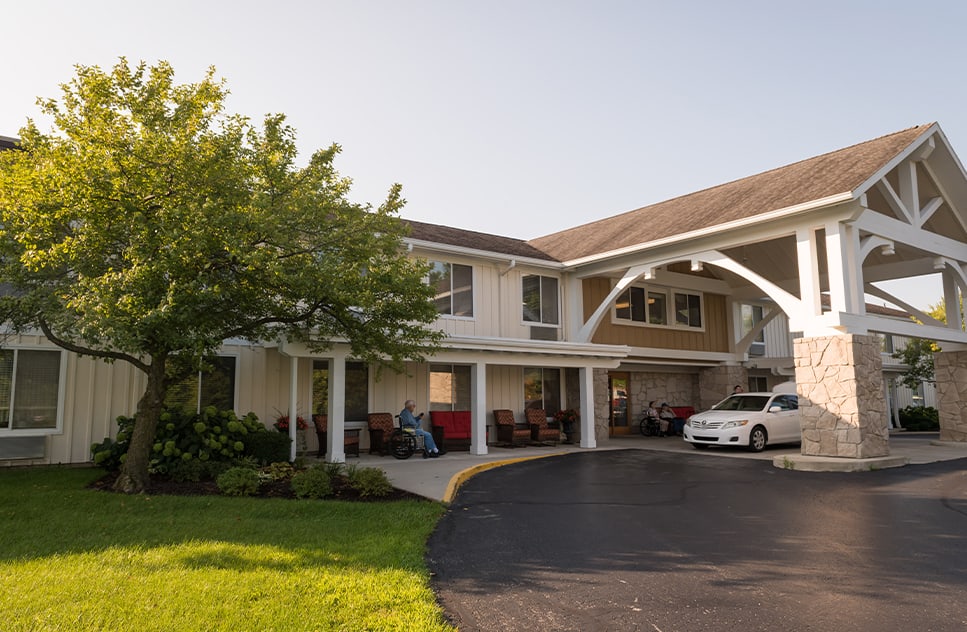Moving your parents out of their home and into senior living, assisted living, or memory care programs can be a difficult and emotional process. Every aspect of this large transition requires careful planning. From finding the right facility for your parents to downsizing your parents’ belongings, there are many crucial decisions to make.
To make the transition easier, here are five things you’ll need to ask yourself when moving your elderly parents out of their home.
- Is it the right time to move?
- How can you keep open communication?
- How are you going to downsize and move their possessions?
- How can you make their new space feel like home?
- What care program is right for their needs?
1. When Is It Time to Move?
The first step in the process of moving your parents is identifying that their current home is no longer safe or suitable for their mobility, social needs, or care needs.
Some concerns that might indicate your parents need to move out of their home include:
- Safety concerns: Are there safety hazards in the home, such as stairs, slippery floors, or lack of accessibility?
- Mental decline: Have they begun to show worsening symptoms of Alzheimer’s disease or dementia? Are you concerned they may injure themselves or wander if left unsupervised?
- Loneliness and isolation: Are they feeling lonely or isolated due to limited mobility, difficulty getting out, or living in an isolated area?
- Health concerns: Is their health declining to the point where they need more assistance than can be provided at home? Is it currently difficult to access proper medical care from their area?
Once it has been decided that your parents are no longer able to live in their current home, you can begin to take steps toward planning their transition to a new home.
2. Keep Communication Open
It’s important to understand that your parents might have trouble sorting out their feelings about moving. While it may be tempting to give them limited information to expedite the process, including them and maintaining open communication can help alleviate confusion.
Open communication fosters a sense of confidence in decisions regarding their care. Some ways that you can keep communication open with your parents include:
- Active listening: Let your parents take part in the process when they can. Show genuine empathy for their feelings and concerns. Involve them as much as possible.
- Compromise: Your parents are the ones uprooting their lives. Be willing to find solutions that work for all of you.
- Reassurance: Let them know you’re there to support them during and well beyond the transition. Work with them to make the best decisions possible for their needs.
3. Planning the Downsize & Move
Once you are on the same page, you can prepare to downsize your parents’ belongings to move. Downsizing can be daunting, so be prepared to make careful considerations during these discussions.
Many aspects of downsizing might be easy to forget about. The most important things to remember when downsizing are:
- Decluttering: By starting early, you will have enough time to carefully go through all your parents’ belongings. Having more time allows you to be sensitive to emotional attachments to their belongings and work through those feelings before tossing items.
- It’s not just stuff: While going through the house and decluttering is important, there are other aspects to consider. You also need to sort out your parents’ finances, professional and medical contacts, their computer files, and so much more.
- Organization: Create a plan for moving and downsizing. Having a plan will allow you to set goals to complete the downsizing process in time for the big move.
If decluttering is taking a mental and emotional toll on you and your parents you can bring in professional help. By consulting a therapist or counsellor to help your parents with processing the move, or by hiring a professional cleaner for the task, you can lift the emotional burden that decluttering can cause.
4. Making New Spaces Feel Like Home

Making your parents’ new space feel like home is an important step in transitioning them into their new space and lifestyle, so encourage them to bring familiar items and decor to their new home.
To support structure in their lives, find a community that can maintain their daily routines as much as possible.
Additionally, social support can be crucial to your parents’ mental health. Help them connect with new neighbours and friends in their community.
Moving into a care facility is a massive lifestyle change. Offer your parents emotional support and practical assistance, and visit them as much as you can, even after the move.
5. Finding the Right Level of Care
Another step in the process is finding the right community to suit your parents’ needs. Consult a doctor to have their needs assessed and talk to local communities near your area to see which one will be a fit.
Some facilities offer tours, allowing you and your parents to meet staff and residents and get a sense of the environment. The tours also help find a place with desirable floorplans and amenities.
Some care options you may come across include:
- Assisted living: For people who have complex medical needs that they need help managing.
- Skilled nursing: For people who are recovering from surgeries, strokes, or intensive medical treatments.
- Memory care: For adults with dementia and Alzheimer’s disease who have extensive medical and care needs.
Schedule a Tour with Us
If you need more support in making the transition, reach out to the Kingston Residence of Fort Wayne or Kingston Center of Fort Wayne. We can provide you with the information you need to make an informed decision and help you navigate this difficult transition.
To learn more about our care programs and facilities you can contact us today.






